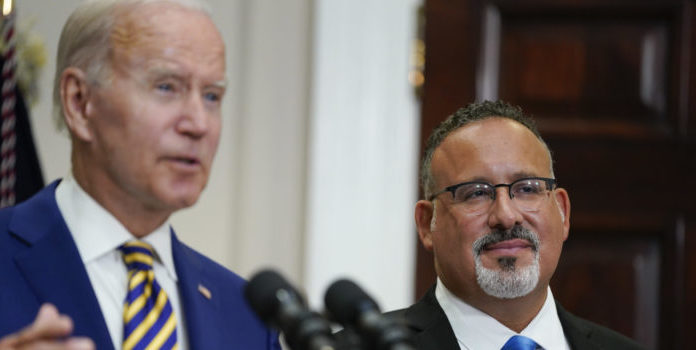(Headline USA) The Biden administration claimed its supposed authority to transfer the burden of student-loan expenses from debtors onto all U.S. taxpayers stemmed from loopholes brought about by the coronavirus pandemic and to a 2003 law aimed at providing help to members of the military.
Legal challenges are expected over the political ploy, calls for which began on the far-left as early as the Obama administration, well before COVID-19 created an excuse for wildly unpopular President Joe Biden’s gambit to bribe millennial voters into salvaging his term.
Skeptics of the administration’s ability to act on its own, without new legislation, had once included Biden himself and House Speaker Nancy Pelosi.
But in a legal opinion released Wednesday, the Justice Department said that the HEROES Act of 2003 gives the administration “sweeping authority” to reduce or eliminate student debt during a national emergency, ”when significant actions with potentially far-reaching consequences are often required.”
The law was adopted with overwhelming bipartisan support at a time when U.S. forces were fighting two wars, in Afghanistan and Iraq. It gives the Education secretary authority to waive rules relating to student financial aid programs in times or war or national emergency.
Former President Donald Trump declared a national emergency in 2020 because of the pandemic, and it remains in effect.
But neither Trump nor Biden, until the president’s announcement on Wednesday, had tried to wipe out so much student debt at one time.
The Justice Department’s legal justification seemed to be anticipating criticism that the broad-based debt cancellation might run afoul of Supreme Court rulings, including a June decision in West Virginia v. EPA limiting the administration’s ability to impose sweeping environmental regulations without congressional approval.
In that case, the court declared that when dealing with such “major questions,” the administration must point to clear congressional authorization when it asserts new power over an important part of the economy.
Other critics have suggested that it stands in violation of the 14th Amendment’s equal protection clause since it selectively offers relief to debtors for arbitrary reasons while punishing those who paid off their loans, saved to avoid going into debt or never took out loans in the first place.
"I've saved all my money. [My daughter] doesn't have any student loans. Am I going to get my money back?"
Elizabeth Warren: "Of course not."
“I worked a double shift…you’re laughing at me…we did the right thing and we get screwed.”pic.twitter.com/xGWKOZi9av
— RNC Research (@RNCResearch) August 24, 2022
But many on the Left appeared to rejoice gleefully in the erosion of constitutional checks on government power while advancing a fiscally reckless policy that is likely to exacerbate the Biden administration’s already historic inflation problem.
The justification for the debt cancellation “seems to tee up nicely—perhaps inadvertently—a major-questions doctrine challenge as the opinion seems to suggest the agency could forgive all student loans for everyone due to pandemic” if the agency head deemed it necessary, Chris Walker, a University of Michigan law professor wrote on Twitter.
Abby Shafroth, an attorney at the National Consumer Law Center, said a challenge to the loan-forgiveness plan could falter in several ways, including the specific reference to national emergencies in the 2003 law.
Both the Trump and Biden administrations have previously relied on the HEROES Act to pause loan repayments during the pandemic and, in Biden’s case, overhaul a student debt forgiveness program for public workers, Shafroth said.
“Today’s action is significant, but not different in kind,” she said.
A separate issue may be finding someone who is harmed by the administration’s action and has legal standing to sue, she said.
The Job Creators Network, which promotes conservative economic policies, said it was weighing a lawsuit to try and block Biden’s plan.
“This executive overreach transfers taxpayer dollars from hardworking ordinary Americans and small businesses to disproportionately higher earners with college degrees,” said Alfredo Ortiz, president and CEO of the group. “It does nothing to address the underlying issue of outrageous college costs. Indeed, it rewards colleges for making education unaffordable and entrenches the failing status quo.”
An Education Department memo, produced in the final days of the Trump administration, concluded that there was no authority to cancel debt on a broad basis.
The department has never invoked the law, or any other statute, “for the blanket or mass cancellation, compromise, discharge or forgiveness of student loan principal balances,” Reed Rubinstein, then an Education Department lawyer, wrote in January 2021.
The issue has been under review for some 18 months, Lisa Brown, the top lawyer at the Education Department, wrote in a separate memo that was released Wednesday and called on Education Secretary Miguel Cardona to rescind Rubinstein’s memo.
Pelosi also reversed course. In Las Vegas Tuesday, Pelosi said that she “didn’t know what—what authority the President had to do this. And now clearly, it seems he has the authority to do this.”
Adapted from reporting by the Associated Press

